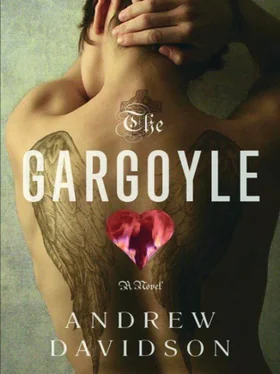During the party, a feeling of strange relief had come over me. From our first meeting, Marianne Engel had shown such irrational affection towards me that I expected it to disappear as abruptly as it had started. Relationships fall apart, that’s their nature. We’ve all seen it a thousand times, even between couples who we were certain were “going to make it.”
I once knew a woman who liked to imagine Love in the guise of a sturdy dog, one that would always chase down the stick after it was thrown and return with his ears flopping around happily. Completely loyal, completely unconditional. And I laughed at her, because even I knew that love is not like that. Love is a delicate thing that needs to be cosseted and protected. Love is not robust and love is not unyielding. Love can crumble under a few harsh words, or be tossed away with a handful of careless actions. Love isn’t a steadfast dog at all; love is more like a pygmy mouse lemur.
Yes, that’s exactly what love is: a tiny, jittery primate with eyes that are permanently peeled open in fear. For those of you who cannot quite picture a pygmy mouse lemur, imagine a miniature Don Knotts or Steve Buscemi wearing a fur coat. Imagine the cutest animal that you can, after it has been squeezed so hard that all its stuffing has been pushed up into an oversized head and its eyes are now popping out in overflow. The lemur looks so vulnerable that one cannot help but worry that a predator might swoop in at any instant to snatch it away.
Marianne Engel’s love for me seemed built on so flimsy a premise that I assumed it would come apart the moment we stepped through the hospital doors. How could a love based on a fictional past survive into an actual future? It was impossible. That kind of love was a thing to be snatched up and crushed in the jaws of real life.
That was my fear, but this Christmas Day had shown me that Marianne Engel’s love was not feeble. It was strapping, it was muscular, it was massive. I thought that it could fill only my room in the burn ward, but it filled the entire hospital. More important, her love was not reserved only for me; it was shared generously with strangers-people she didn’t think were friends from the fourteenth century.
All my life I had heard foolish stories about love: that the more you give away, the more you have. This had always struck me as nothing more than a violation of basic mathematical principles. But watching Marianne Engel share her love so widely awakened in me the weirdest of romantic feelings: the opposite of jealousy.
It comforted me that love was her soul’s natural condition and not an aberration built on fantasies. Her love was not a lemur, an animal so named because Portuguese explorers in Madagascar noted large shining eyes peering out of the forest when they sat around their campfires. Convinced that these eyes belonged to the spirits of their departed companions, they christened the animals with the Latin word meaning “spirits of the dead.”
· · ·
When the last turkey leg had been eaten, Marianne Engel thanked each caterer and passed out envelopes that contained “just a little something extra for working on the holidays.” While she was wheeling me back to my room, she claimed that this was the best Christmas she’d ever had. I pointed out that that was quite a claim, given that she’d had seven hundred.
After she helped me into bed, Marianne Engel sat with a satisfied thud. I observed that the party must have cost her a fortune; she dismissed this with a wave of her hand and pulled the silver briefcase from under my bed. “Open it.”
The briefcase was fat with sleeves of bills, fifties and hundreds. In my days of pornography and drugs, I’d seen the occasional satchel of cash, but nothing like this. I spun the numbers around my skull, trying to come up with a rough estimate. It was difficult to do the math-I was still too stunned by the fact of the money-so Marianne Engel saved me the trouble. “Two hundred thousand.”
Two hundred thousand dollars. Which she’d left sitting under the bed all day. Which anyone could have walked away with. I called her stupid; she laughed and replied that against stupidity even the gods struggle in vain. And really, she asked, who would look under a hospital bed on Christmas Day for a briefcase of money?
“You think I can’t afford you.” She stated it as if there were no possibility that she might be wrong. She wasn’t. When I nodded, she said, “I’m ready for my present now.”
Over the previous weeks I’d fashioned dozens of versions of the same little speech, like a high school boy plotting how to ask his favorite girl to a dance, but now that the moment was upon me, I felt only uncertainty. Timidity. Embarrassment. I wanted to be suave but, just like that high school boy, I was struck dumb. It was too late to escape, and I knew that my gifts-there were three-were too personal. Too stupid. My hours of labor had been to no avail: what prideful delusions had convinced me to make these gifts? She’d think them childish; she’d think me too forward, or not forward enough. I wished for lightning bolts to blitz my room, to pierce the bedside table where my silly little offerings were hidden in a drawer.
I had written three poems for her. The spinesnake laughed at the sheer arrogance of my efforts.
All my life, I had written poetry, but I’d never shown it to anyone. I hid my writing, and hid myself within the writing that I kept hidden-only a man unable to handle the actual world would create another one in which to hide. Sometimes when I realize that I couldn’t stop writing even if I wanted, a wave of discomfort shudders down my back, as if another man were standing too close to me at the public urinals.
Sometimes I feel there is something profoundly unmanly about any writing, but poetry is the worst of all. When I was gripped by fits of cocaine paranoia, I would burn my poetry journals and watch the burning pages peel off one another in layers, the flames spitting little gray flakes into the air. As my ashen words swirled into the heavens, it pleased me to know that my inner self was once again safe: a team of the FBI’s best forensic scientists couldn’t put my emotions back together again. The beauty of keeping my truest emotions hidden in my writing was that I could incinerate them at a moment’s notice.
Speaking a woman into bed was safe, because my words disappeared with the vapor of my spoken breath; writing a poem for a woman was fashioning a weapon that she could later use to assault me. Giving away one’s writing meant that it would be out there in the universe forever, ready to come back to wreak vengeance at any moment.
So I’d blown it. It was Christmas Day, I was stuck in the skeleton bed, I owed Marianne Engel a present, and I had no backup gift. I had only the childish scrawls that blackened the pages’ white purity. My words were Egyptian hieroglyphics before the discovery of the Rosetta stone; my words were wounded soldiers limping home, guns spent, from a lost battle; my words were dying fish, flipping hysterically as the net is opened and the pile spreads across the boat deck like a slippery mountain trying to become a prairie.
My words were, and are, unworthy of Marianne Engel.
But I had no choice, so I reached into the desk drawer and- LOSER-screwed my pale imitation of courage to an imaginary sticking place. I pulled out the three single sheets of paper, closed my eyes, and held the poems in Marianne Engel’s direction, hoping they wouldn’t rot in my hands.
“Read them to me,” she said.
I protested that I couldn’t. These were poems, and my voice was a deal at the crossroads gone horribly wrong. A fiery hellhound had broken into my throat and left behind a busted guitar with rusty strings. My voice was-is-majestically unfit for poetry.
Читать дальше











